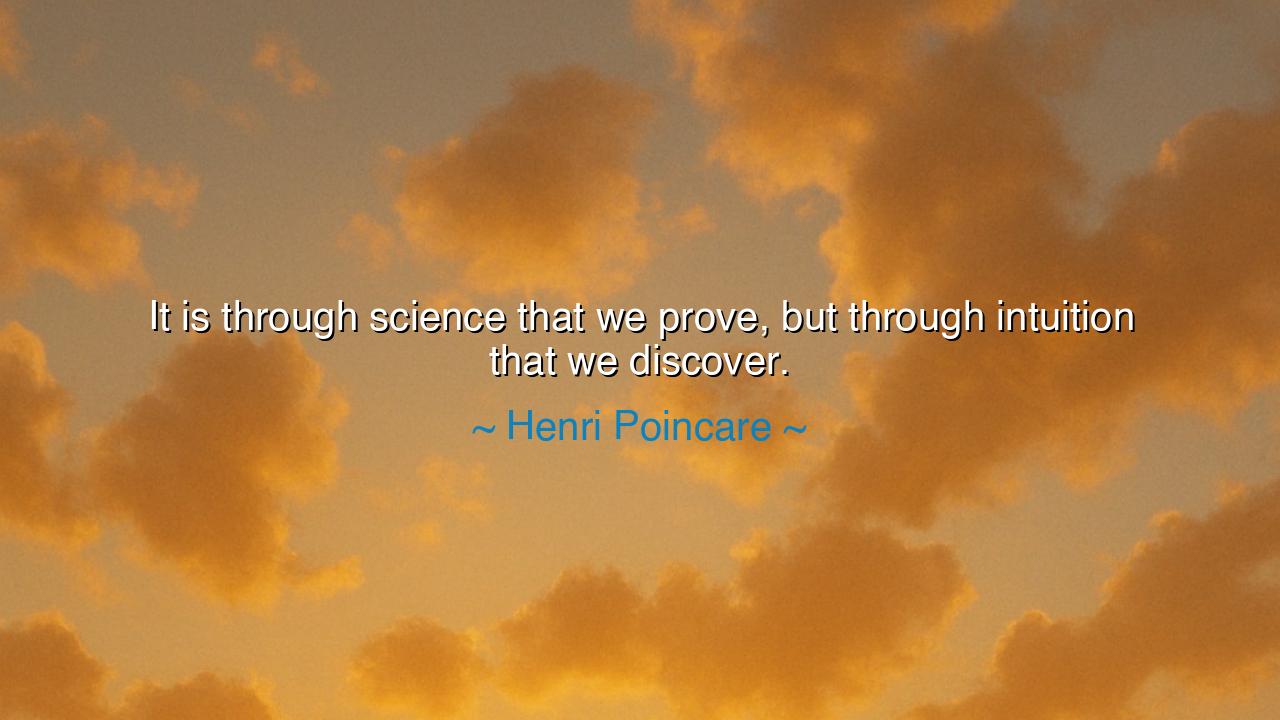
It is through science that we prove, but through intuition that






"It is through science that we prove, but through intuition that we discover." These words, spoken by the brilliant Henri Poincaré, hold within them a deep wisdom about the dual nature of human understanding. In this insight, Poincaré reveals two forces—science and intuition—that shape our search for knowledge. Science, he tells us, is the tool by which we validate, test, and prove our ideas, grounding our understanding in the firm foundation of evidence. Yet, intuition—the quiet, often mysterious force—leads us to the very discovery of new ideas, guiding us toward paths that logic alone cannot trace. Science and intuition are not opposing forces, but complementary ones, each essential to the pursuit of truth.
In the ancient world, the search for truth was often framed as a quest for wisdom, an understanding of the deeper principles that governed the cosmos. The Greek philosophers, like Plato and Aristotle, sought knowledge through rigorous study and logical reasoning. But even they understood that reason alone was not enough. Socrates, the great wisdom seeker, often spoke of the need to reach beyond the confines of logic and to tap into something more profound—an inner knowing, a spark of insight that could guide the philosopher toward the truth. This intuitive sense was not mere guesswork, but a deep, almost mystical understanding that could precede formal reasoning. In this sense, intuition was as much a part of the search for wisdom as reason itself.
Consider, for a moment, the great discoveries that have shaped our understanding of the universe. Albert Einstein, in his groundbreaking work on relativity, spoke of how many of his theories were born not just from mathematical reasoning but from intuitive insight. Einstein described how he would often “see” the laws of nature in his mind’s eye, allowing his intuition to guide him toward the right questions. It was only later, through science, that he was able to prove his ideas with mathematical rigor. His theories of relativity were not merely the result of logical deduction; they were the product of his ability to feel the truth, to discover something new through the quiet voice of intuition, before the structure of science could validate it.
This same dynamic between science and intuition can be seen in the work of Marie Curie, whose discoveries in radioactivity revolutionized our understanding of matter. Curie was guided by a profound intuition about the nature of elements and their behavior, a sense that led her to explore the unknown realms of atomic energy. But her discoveries were not merely based on feeling or speculative thought; they were grounded in the rigorous, methodical approach of science. Intuition led her to the questions; science provided the means by which those questions could be answered. She, like many great minds, embodied the perfect marriage between intuitive discovery and scientific proof.
Yet, Poincaré’s quote is not just about the scientific pioneers of the past; it is about the way all of us engage with the world of knowledge. In our daily lives, we are constantly faced with choices, decisions, and challenges that require both logic and gut feeling. When you embark on any endeavor, whether it be a work project, an artistic creation, or a personal relationship, you must first be open to the quiet nudges of intuition—that inner voice that tells you where to begin, what to explore, and how to approach a problem. Yet, once you have that spark of insight, you must prove it through diligent work, through the scientific method, and through the testing of your ideas. Intuition offers you the path, and science ensures you walk it with certainty and purpose.
The lesson here is clear: neither intuition nor science can stand alone. Intuition may ignite the flame of discovery, but it is only through the disciplined work of science that we bring those discoveries to the light of understanding. Poincaré reminds us that the greatest advancements in knowledge—whether in the realm of art, science, or life—come from the marriage of these two forces. Just as the philosopher must use reason to explore the mysteries of existence, so too must the scientist allow intuition to guide their explorations into the unknown. To be truly great, we must nurture both the rational and the intuitive aspects of our minds, knowing when to trust our inner knowing and when to rely on the solid ground of evidence.
In your own life, strive to cultivate both your rational mind and your intuitive sense. When faced with a problem or a new endeavor, begin by listening to your inner voice, your gut feeling about the right path forward. But do not stop there. Once you have your insight, apply the method of science—test, measure, and refine your approach. Just as the ancients combined wisdom and reason, so must we combine intuition and logic in our quest for truth. For it is in the balance of these two forces that the true nature of reality is revealed, and in this balance, we unlock the deepest potential of our understanding and our lives.






AAdministratorAdministrator
Welcome, honored guests. Please leave a comment, we will respond soon